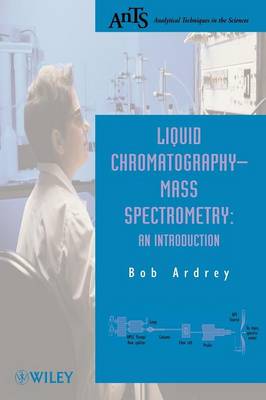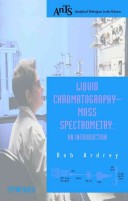Analytical Techniques in the Sciences (AnTs)
1 primary work • 3 total works
Book 1
First explaining the basic principles of liquid chromatography and mass spectrometry and then discussing the current applications and practical benefits of LC-MS, along with descriptions of the basic instrumentation, this title will prove to be the indispensable reference source for everyone wishing to use this increasingly important tandem technique.
* First book to concentrate on principles of LC-MS
* Explains principles of mass spectrometry and chromatography before moving on to LC-MS
* Describes instrumental aspects of LC-MS
* Discusses current applications of LC-MS and shows benefits of using this technique in practice
* First book to concentrate on principles of LC-MS
* Explains principles of mass spectrometry and chromatography before moving on to LC-MS
* Describes instrumental aspects of LC-MS
* Discusses current applications of LC-MS and shows benefits of using this technique in practice
Techniques of Modern Organic Mass Spectrometry
by Robert E. Ardrey, Alex Allan, and Peter Ashton
Published 7 December 2012
This book emphasises the dramatic advances in mass spectrometry in recent years, particularly in ionization techniques and instrument performance. Offering a comprehensive background into mass spectrometry, this text efficiently guides readers through this complex technique, making it particularly valuable to students. Key features: * The current state of mass spectrometry is described in a manner appropriate for a multidisciplinary readership, aiming at a student/introductory researcher audience and people using mass spectrometry with little or no previous background knowledge. * Provides a foundation for understanding mass spectrometry by providing examples of application from current literature and through self-assessment exercises. * Techniques of Modern Organic Mass Spectrometry' fills a gap in the market, providing core reading for students in a variety of chemistry fields as well as appealing to industrial laboratories in broader disciplines.
First explaining the basic principles of liquid chromatography and mass spectrometry and then discussing the current applications and practical benefits of LC-MS, along with descriptions of the basic instrumentation, this title will prove to be the indispensable reference source for everyone wishing to use this increasingly important tandem technique. First book to concentrate on principles of LC-MS Explains principles of mass spectrometry and chromatography before moving on to LC-MS Describes instrumental aspects of LC-MS Discusses current applications of LC-MS and shows benefits of using this technique in practice


